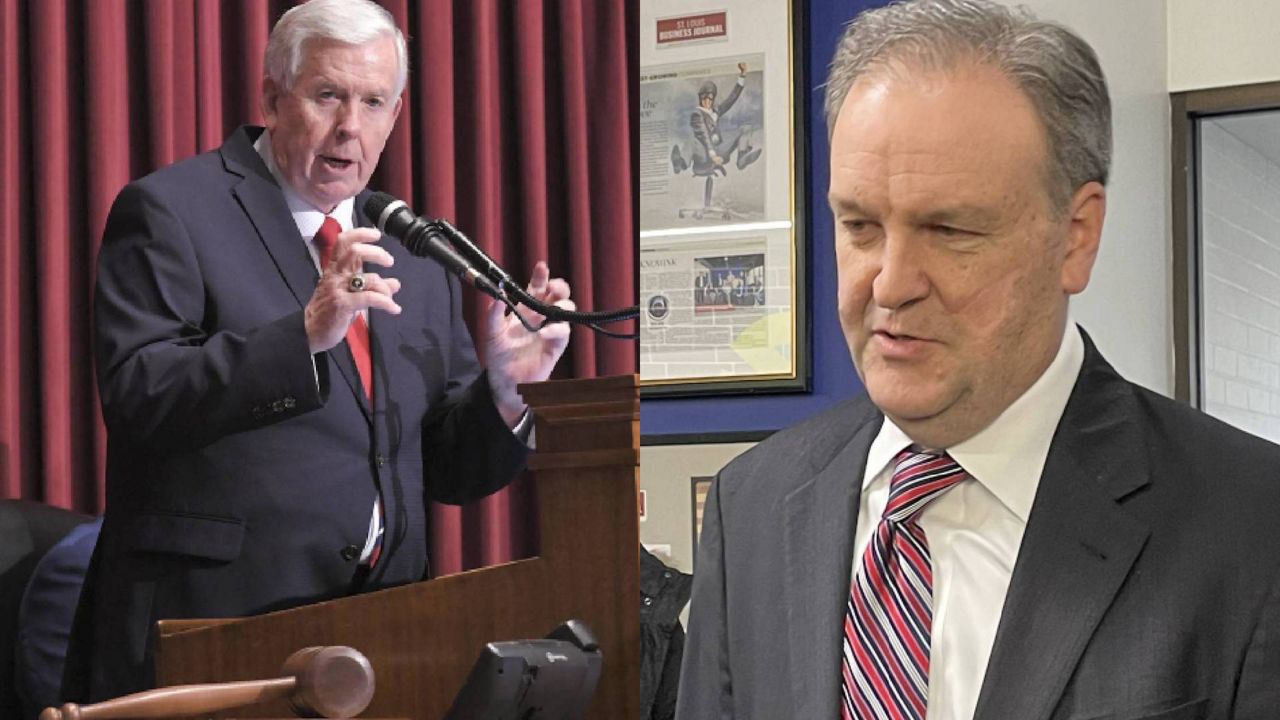ST. LOUIS—Missouri Attorney General Andrew Bailey released a 62-page document titled the “Kim Gardner Report”, detailing his investigation into the former St. Louis Circuit Attorney who resigned after a string of calls for her to step down, including efforts by Bailey’s office.
Bailey says he hopes the report will help people “understand the profound and willful failures” of Gardner and will prevent a “ruinous situation” from arising in the future.
“You had a prosecuting attorney who was refusing to charge new cases referred by the police department, and there was a stack of at least 4,000 cases pending that she had not addressed,” Bailey told Spectrum News Tuesday morning when explaining the biggest takeaways from the investigation.
He added Gardner was dismissing more cases than she was filing, and the cases that were filed, he explained she wasn’t moving to trial.
“It was a complete and utter breakdown of the criminal justice system.”
Bailey filed a quo warranto suit in February 2023 to try and remove Gardner from office, alleging she failed to prosecute cases, that she failed to inform and confirm victims and failed to appropriately fill vacancies, leaving her staff with an “unmanageable workload.”
Gardner resigned on May 16, just two hours before a hearing. Her decision also came under political pressure as lawmakers were considering legislation that would have allowed the Governor to appoint a special prosecutor. The bill passed in the House.
“The public is entitled to know the mistakes that Kim Gardner made, especially after she tried to deprive the public of access to information by resigning a mere two hours before the Court could order disclosure of several records,” said Bailey.
The report includes how the attorney general says Gardner used “delay tactics” against the quo warranto suit. It also highlights never-before-released statements from judges, Circuit Attorney employees, law enforcement and victims.
There are also calls for changes to state laws for keeping victims and their families informed about cases; preventing a person ineligible to run for a particular public office after being removed from that office by a quo warranto; and to speed up discovery by granting the attorney general access to the State’s files in a quo warranto case.
“It was a catastrophic social experiment that failed miserably, and the people suffered,” said Bailey.
The report also mentions Gardner’s “knowing and willful dereliction of her duties.” The investigation found her pursuit of an advanced nursing degree while holding the office “demonstrated a lack of accountability.”
Gardner began studying in Aug. 2021 until the time of her resignation, according to Bailey. She was paid nearly $300,000 during that time.
“On April 27, Gardner spent the morning at the Family Care Health Centers performing clinicals until 12:44 p.m.,” according to the report. Less than an hour later “At 1:30 p.m., Judge Noble conducted a Show Cause hearing. Ms. Gardner failed to personally appear. Judge Noble issued a Show Cause Order, making the extraordinary finding that there was probable cause to believe that Ms. Gardner and her ACA were guilty of indirect criminal contempt.”
Bailey suggested Tuesday that Gardner's actions could still leave her exposed to civil or criminal liability nearly six months after her resignation.
"At the end of the day she was attending nursing classes rather than devoting her full time and energy to the discharge of her official duties which was her legal obligtioon and so I think we have to look at whether or not she was exploiting or taking advantage of or stealing from the public treasury," he said.
The report also includes testimony from judges, circuit attorney staff, law enforcement and victims.
Here are comments from judges:
- There comments expressed a common theme that under Gardner, the Circuit Attorney’s Office was “in a state of complete dysfunction.”
- One judge observed that under Ms. Gardner, the Circuit Attorney’s Office had “near constant turnover.” As another judge put it, “The assistant circuit attorneys are not in an environment where they can be successful.”
- "The judges noticed that Ms. Gardner began directing her staff to force judges to enter orders dismissing cases for lack of prosecution, in an apparent effort to redirect the community’s ire from Ms. Gardner to the 22nd Judicial Circuit."
- "That practice resulted in what one judge called “a complete breakdown in the entire justice system.” As a result, the circuit had to adopt an administrative rule for reassigning dismissed and refiled cases. This pattern and practice helped explain why the circuit court had dismissed 2,735 criminal cases during Ms. Gardner’s tenure as Circuit Attorney"
Here are comments from law enforcement:
- "Members of law enforcement provided a series of personal experiences that painted the same picture: due to staffing issues and directives from Ms. Gardner, the Circuit Attorney’s Office was im-peding the orderly administration of justice in St. Louis City." Officers also identified the impact that Ms. Gardner’s willful neglect had on the effectiveness and the morale of the police force. One officer explained that they put their “life into these cases and then no one cares.”
- Officers reported that, under Ms. Gardner, witness cooperation and involvement had “gotten worse” due to a lack of trust in the office from the community. Officers cited dismissals and refilings on the day of trial; a fear in witnesses that even if they cooperated, the Circuit Attorney’s Office could not hold the defendant accountable
Here are comments from staff:
- "Ms. Gardner would avoid or refuse to meet with staff members to hear their concerns. One former employee explained that Ms. Gardner was openly distrustful of employees who had been hired by the prior administration, and that her distrust of such employees was obvious."
- "Ms. Gardner’s mismanagement was compounded by the fact that, as one former employee put it, “[Ms. Gardner] did not fully understand what assistant circuit attorneys do” at work."
- After becoming Circuit Attorney, Ms. Gardner began to assert more and more control over the day-to-day functioning of the office, including, for example, requiring that all plea offers be personally approved by Ms. Gardner. Despite imposing this requirement on her employees, Ms. Gardner was difficult to reach, and often would not approve—or even respond to—proposed plea offers.
Here are comments from victims:
- Their accounts showed that Ms. Gardner was failing to comply with her statutory and constitutional duties toward victims. Some victims reported that they would receive
- an initial communication or intermittent communication from the CAO, but that they then stopped receiving other important communications about court dates, bond hearings, dismissal of their cases, plea negotiations or plea agreements, the final disposition of their cases, or the release of the defendant from custody.
- When the victim and another family member flew in from another state for trial at their own expense, they learned that the trial would not take place. No one had told them anything.
Spectrum News contacted Gardner for comment Tuesday morning and have not heard back.
At the time, Gardner called the quo warranto filing a “political stunt” by Bailey, who is running for election in 2024.
Bailey filed the petition after Gardner’s office was criticized for its handling of a case involving armed robbery suspect Daniel Riley who violated terms of his bond more than 50 times, and has now been accused of being behind the wheel in a car accident that left a Tennessee teenager without the use of her legs.
Gardner has blamed the judge in the case for allowing the defendant to remain free on bond, and has said the effort to have her removed goes against the will of the voters of St. Louis who have elected her twice to the post.









